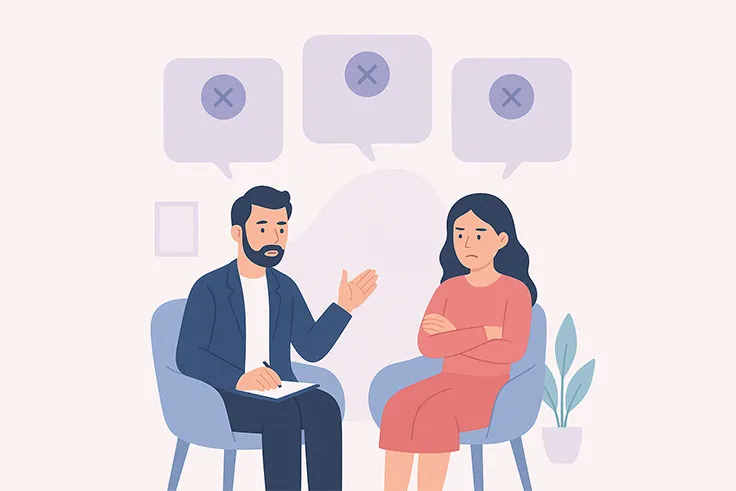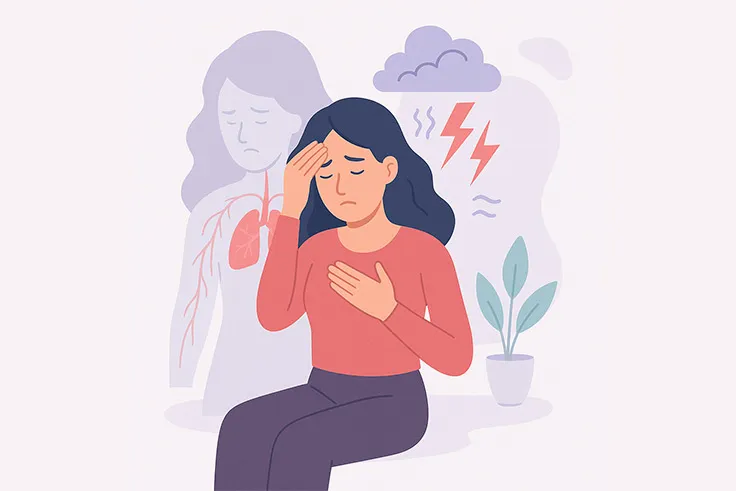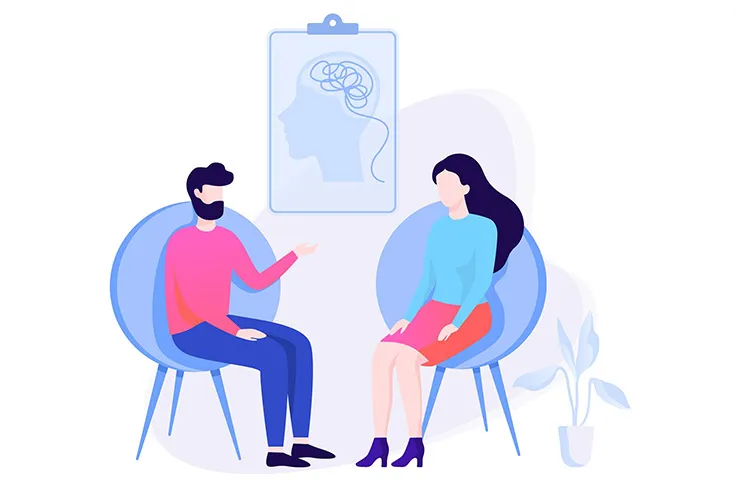
Anxiety in Children
Anxiety is a biological phenomena that happens as a response to stress. It is a natural emotion that is guided by a feeling of fear or apprehension about what is to come added with physical signs such as, rapid heart rate, sweating, or feeling tired. Children too, just like adults, feel worried and anxious at times.
Children can feel anxious about several things at different ages, a lot of these fears of triggers are a normal part of growing up and often go away with time. However, anxiety might get the best of them if it starts to interfere with their daily routine. If you were to go to a school on an exam day, you would likely find all the kids to be anxious, but some might be bothered enough to not even show up for the test. Also depending upon their age, children have varied ability to understand or explain their anxiety.
Anxiety may be deeply rooted in children due to blend of various reasons including:
- Biological factors, such as genes or even brain wiring
- Psychological factors, such as coping mechanisms or temperament issues
- Environmental factors, such as anxious parenting or sometimes even traumatic early childhood experiences
Types of anxiety in children and how it affects them
Some children naturally tend to be affected by anxiety and be worried more than others. One of the most common causes of anxiety in kids is when affected by change and they might get anxious following a change of place, or if starting a new school. Childrens get worried, or feel sad about things from time to time about various things. But if they fail to outgrow these fears that occur when they are young, they may be diagnosed with anxiety disorders.
Certain types of anxieties that are common in children are as follows:
- Generalized anxiety: Also referred to as GAD, is often diagnosed when kids worry excessively about a broad range of things like, what might happen, or about their own past experiences and behaviour, how good they are academically or how popular they are. Often lacking confidence and needing loads of reassurance.
- Separation anxiety: Anxiety in kids is usually observed in toddlers or young children. They get upset and extremely anxious when parted from parents or objects of affection they tend to keep at close proximity. Refusing to attend sleepovers, or school, worrying that bad things might happen to loved ones when away.
- Social anxiety: Intense fear of social situations, being extremely anxious and self-conscious while around others, worrying about being judged or having to face humiliation.
- Specific phobias: Severe fear set off by a specific situation or a thing, often irrational in nature, such as flying cockroaches, or insects in general, loud thundering, or even other kids in general.
Symptoms for anxiety in Kids
Children come up with their own ways to deal with anxiety and strategies for managing stress which usually is to avoid these situations or letting a parent handle it for them. While these can work in the short term scheme of things, avoiding it often leads to it getting more difficult for them to handle the next time they have to face similar situations which might cause them even greater amount of discomfort. Anxiety can cause several physical symptoms such as, sleeplessness, diarrhea, stomach aches, headaches, irritability, difficulty concentrating or tiredness.
When children feel anxious, they cannot always understand or express what they are feeling. However, the following are a few general signs and symptoms of anxiety in kids:
- If they are seeking reassurance very often
- If they tend to avoid social situations and feel worried or scared about it
- If they try to get others to do things that they are worried about
- If they tell you they have physical pains without any signs of injury as such
- If they seem more disinterested than usual and have lots of fears
- If they tend to get upset easily and cling on to a loved one
- If they always see the negative side of things instead of taking risks
Causes of anxiety in Kids
More often than not, children tend to feel anxious and stressed out over various issues and such worries are a normal part and parcel of their lives. But, this kind of anxiety can get out of hand and might affect their development negatively.
A child of ages 2-3 will stop feeling anxious over brief periods of separation from parents, however, if this kind of anxiety follows up to the ages of 6-7, it may be a condition called separation anxiety. This anxiety is developmentally inappropriate, and thus your child may require treatment and a behavioural plan. Other reasons could be underlying mental or physical health concerns such as ADHD, autism spectrum disorder, learning disabilities, etc. Preschool age children also tend to develop specific fears or phobias, and while these phobias go away as children grow up, in some cases they don’t. Situational and environmental factors are also an important consideration when we talk about the causes of anxiety in kids. Often, drastic changes in environment, or during the time when exams are being conducted, or in social situations, children may develop symptoms of anxiety and may need parental or professional support.
Ways to manage and ease anxiety
No parent would want to see their wards be in despair and even their well-meant intentions can make them get into a negative-cycle. And just by not wanting their child to suffer they might exacerbate their kid’s anxiety.
Being healthy is not only an important aspect of having a healthy life physically it is also significant in terms of being able to manage and lead a healthy mental life too. In addition to getting the right kind of support a healthy diet can play an important role in managing symptoms of anxiety.
A few pointers for guardians and parents on supporting children facing anxiety are:
- Maintain a healthy diet, which is focused on fruits, green vegetables, whole grains, legumes and lean protein sources, nuts and seeds. Exercise for at least an hour and get enough sleep.
- The goal is to help the child manage their anxiety and not do it for them by eliminating it, this serves as a life lesson for them and also forms the basis of a guide on how to manage it themselves as they grow up. Instead of trying to remove the stressors or the causes of anxiety, the child must be assisted to tolerate or cope with it in healthy ways.
- By expressing positive but realistic expectations to a child will give them confidence that even if they fail at something or some task, it is still okay and does not mean the end of the world for them.
- You must respect their feelings or worries but that should not mean you agree with it. If the child is afraid of participating in an activity, you should listen and be empathetic towards them and encourage them to face their fears instead of cancelling the event.
- Encourage them to identify the stressors and signs of what causes them anxiety but also allow for them to be able to ask for help from you.
Submit a Comment
Your email address will not be published. Required fields are marked *
Related reading
What Not to Expect from Therapy: Dispelling Common Misconceptions
24 April, 2025
You finally booked your first therapy session, nerves and hope swirling inside you. Maybe you’ve heard that therapy can work wonders – and it can. In f...
It’s Not Just in Your Head: How Trauma Affects Your Body and How You Can Heal
23 April, 2025
Have you ever noticed aches, fatigue, or tension in your body after a stressful or traumatic experience? If so, you’re not alone. When we think of trauma...
How to Prepare for Your First Therapy Session: A Beginner’s Guide
5 March, 2025
Choosing to begin therapy is a courageous and empowering decision. It signifies your willingness to invest in your mental and emotional well being, it’s ...





